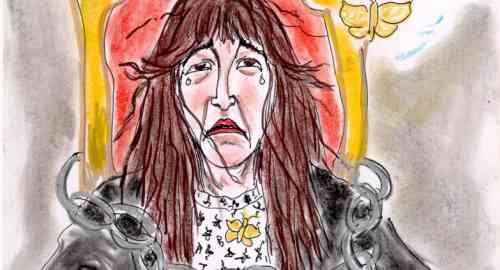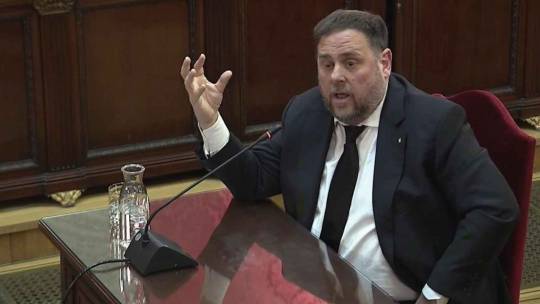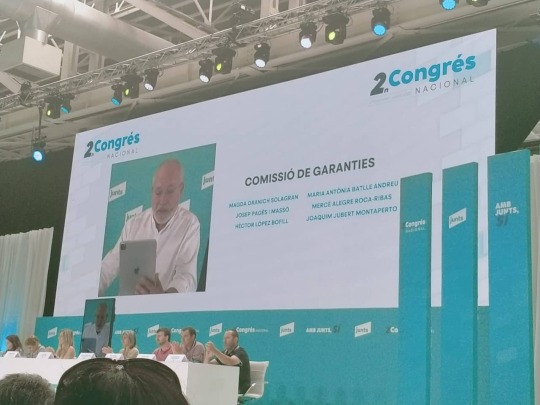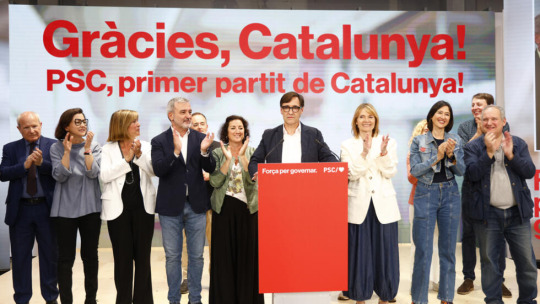#Junts per Catalunya
Text
El Parlament suspende a la Presidenta Laura Borràs por su proceso judicial por corrupción.
Viñeta: El Parlament suspende a la Presidenta Laura Borràs por su proceso judicial por corrupción
#comics #Comic #Sketch #tebeos #drawing #Dibujos #comicartwork #tirascomicas #viñetas #HumorGrafico #Historieta #lauraborràs #juntspercatalunya #Independencia
(© Julia) La BORRÀS otra como la OLTRA, que se niega a dimitir. Dice que tendrán que “matarla y ensuciarse las manos si quieren que se vaya…”
¡Cómo les cuesta dejar el Poder!
(© Julia) El rincón de Julia
«Viñetas de «Rabiosa Actualidad»
‘Radiaciones Comiqueras de Menorca’
Cómic Digital de la isla de Menorca
¿ Quieres Promocionar TUS DIBUJOS ?
Envíalos AQUÍ y los publicaremos
Para tus cómics…

View On WordPress
#canalmenorca#cómic#Comic Art Work#cómics#dibujos#Digital Art#Drawing#historieta#Humor Gráfico#illustration#ilustración#Independencia#Junts per Catalunya#laura orràs. parlament de Catalunya#Sketch#tebeos#Tiras Cómicas#viñetas#WebComic
1 note
·
View note
Text
0 notes
Text
#cultura#POLÍTICA#CATALUÑA#ESPAÑA#REINO DE ESPAÑA#SU MAKESTAD FELIPE VI#Felipe VI#Junts Per Catalunya#política#MIRIAM NOGUERAS
0 notes
Text
Puigdemont presume de que tendrá sometido a Sánchez a un chantaje permanente
Asegura que las negociaciones para la autodeterminación y el reconocimiento nacional se harán fuera de España y con un mediador internacional.
Pablo Planas
Puigdemont – Foto archivo
El expresidente de la Generalidad prófugo y socio de referencia desde este jueves del presidente del Gobierno, Pedro Sánchez, ha utilizado la misma sala del Club de Prensa de Bruselas en la que compareció por primera…

View On WordPress
#Amnistía#Autor Pablo Planas#Carles Puigdemont#Cataluña#Desafío separatista#Junts per Catalunya#Libertad Digital .com#PSOE
0 notes
Text
Protestar amb xinxetes i oli
La Vuelta va acabar ahir el seu pas per Catalunya. N’ha deixat, en el pla esportiu, dues etapes que van ser un fiasco i dues etapes gairebé excel·lents. Els dos fiascos són les dues etapes que van transcórrer per Barcelona i la que hi va arribar. No només pel temps que hi va fer, sobretot perquè l’organització va ser impròpia i perillosa. Ja sé que no hi ha res a fer i que les ciutats seguiran…
View On WordPress
0 notes
Text
#ElSocialisto🥀 Junqueras podrá ser candidato en las generales de 2023 si Pedro Sánchez rebaja la sedición a 5 años
#ElSocialisto🥀 Junqueras podrá ser candidato en las generales de 2023 si Pedro Sánchez rebaja la sedición a 5 años
El abaratamiento del delito en ese rango beneficiaría más al líder de ERC y a Marta Rovira que a Carles Puigdemont, que tendría que ir a prisión.
Source link

View On WordPress
#Cataluña#erc#Gobierno de España#Independentismo#Junts per Catalunya#Oriol Junqueras#Pedro Sánchez#Procés catalán#Tribunal Supremo#Tribunales
0 notes
Text
Deuxième congrès des Junts per Catalunya à L'Hospitalet de Llobregat
Deuxième congrès des Junts per Catalunya à L’Hospitalet de Llobregat
Ce week-end, le 2e Congrès des Junts per Catalunya s’est tenu à L’Hospitalet de Llobregat, le parti créé par Carles Puigdemont et désormais dirigé par Laura Borràs et Jordi Turull. Enric Balaguer, secrétaire général d’Unitat Catalana et aussi conseiller nacional de Junts per Catalunya a participé à ce grand rendez-vous. Rappelons qu’il y a un an un accord a été signé un convention pour une…

View On WordPress
#2022#Jordi Turull#Josep Rull#Junts per Catalunya#L&039;Hospitalet#Laura Borràs#Le Journal Catalan#Llobregat#perpignan#Pyrénées-Orientales
0 notes
Text
LLISTA D'ORGANITZACIONS I INICIATIVES PRO-PALESTINA ALS PAÏSOS CATALANS, ACTUALITZADA (MAIG 2024)
com tumblr és una plataforma angloparlant, la majoria de les notícies que circulen són de moviments i mobilitzacions als estats units, canadà, anglaterra, i altres països anglos. i encara que està molt bé construïr solidaritat interacional i assabentar-se del que passa a altres indrets del món, cal no perdre la vista sobre les accions i els esdeveniments que ens cauen molt més a prop.
han passat uns mesos després de la primera llista que vaig fer, i per sort, l'activisme pro-palestí segueix creixent als països catalans, amb manifestacions, col·loquis i xerrades, i ara, les primeres acampades estudiantils. on jo he trobat més convocatòries és a través d'instagram, però si coneixeu algun altre recurs digueu-m'ho.
ASSOCIACIONS GENERALS
Comunitat Palestina de Catalunya. porten molts anys fent activisme i estan molt actius a xarxes socials. de fet, la majoria dels enllaços en aquesta llista vénen d'ells. INSTAGRAM / TELEGRAM / TWITTER
Comunidad Palestina de Valencia (en català i castellà) - FACEBOOK
Associació Catalana de Jueus i Palestins - JUNTS
Coalició Prou Complicitat - INSTAGRAM / TWITTER
Samidoun España (no és exclusiu dels PPCC, però penja moltes accions i convocatòries que si que ho són). INSTAGRAM / FACEBOOK
Casa Palestina Catalunya - TELEGRAM / FACEBOOK / WHATSAPP
BDS (Boycott, Divest, Sanction)
BDS - Pàgina oficial (en castellà)
Llista de productes, serveis i empreses per boicotejar que col·laboren amb l'ocupació israeliana i estan presents als PPCC
Directori BDS Catalunya (‼ pot no estar actualitzat ‼)
BDS - Red Solidaria Contra la Ocupación en Palestina. Perfil general de les organitzacions BDS a l'estat espanyol (en castellà)
BDS País Valencià. TWITTER / INSTAGRAM / FACEBOOK / TELEGRAM
BDS Girona
BDS Castelló
BDS Bages / Catalunya Central
BDS Alacant
🏕 ACAMPADES ESTUDIANTILS 🏕
Universitat de València - Acampada Palestina UV. Accepten a qualsevol persona que vulgui unir-se, i també donacions de diners o de menjar. TELEGRAM - TWITTER
@useless-catalanfacts podries tornar a difondre això? Moltes gràcies!
Llista més exhaustiva d'associacions regionals a sota d'aquest separador.
CATALUNYA
BARCELONA CIUTAT
Comitè de Solidaritat amb Palestina de Sants-Montjuïc
UAB Acció per Palestina
Comitè Solidaritat Palestina Facultat Dret UB
Comitè de Solidaritat amb Palestina del Campus Diagonal
Comitè estudiantil de solidaritat amb el poble palestí
PROVÍNCIA DE BARCELONA
Penedès amb Palestina - LINKTREE
RipoPalestina (Ripollet)
Molins amb Palestina (Molins de Rei)
L'Hospitalet amb Palestina
El Montserratí X Palestina
SUMUD Palestina (Santa Coloma de Gramenet) - FACEBOOK
PROVÍNCIA DE TARRAGONA
Terres de l'Ebre amb Palestina
PROVÍNCIA DE LLEIDA
Comitè en Solidaritat amb Palestina de Lleida
PROVÍNCIA DE GIRONA
Pla de l'Estany amb Palestina
La Garrotxa amb Palestina
Ripoll amb Palestina
ALTRES
PalestinaCatCentral
ILLES BALEARS
Mallorca per Palestina
Plataforma de Solidaritat amb el Poble Palestí d'Eivissa
PAÍS VALÈNCIA
Estudiants per Palestina
63 notes
·
View notes
Text
Marc Lesan, Oriol Lapeira i Iñaki Sola són tres amics de Nou Barris (Barcelona) que des de fa gairebé dos anys fan el pòdcast L'Arrabassada, un pòdcast d'humor i d'anàlisi política i social.
Decidir començar un pòdcast, que seria en català, els va portar a fer el canvi i començar a parlar en català entre ells. Són un bon exemple de què podem fer per mantenir el català.
Com a conseqüència de la situació de minorització i discriminació social del català, molta gent es coneix en castellà (o en francès o en italià, a la Catalunya Nord i l'Alguer). Arribem a veure situacions ridícules on grups d'amics catalanoparlants es relacionen únicament en castellà (/francès/italià). Depèn de nosaltres que el català formi part de les vides de la població, que se senti als carrers, i que formi part dels nostres records amb les nostres persones estimades, en comptes d'abandonar tot aquest espai a la llengua dominant. Adonar-nos de quins espais hem deixat de banda i recuperar-los, com han fet els amics de L'Arrabassada, és una gran acció anti-imperialista.
Ja ho he explicat alguna vegada en aquest blog, els meus pares també es van conèixer en castellà i els primers anys que sortien junts parlaven en castellà entre ells (cosa que ara se'ns fa estranyíssima de pensar a tots tres), malgrat tots dos ser catalanoparlants a casa. Per consciència política, es van replantejar la situació i van decidir fer l'esforç de parlar-se únicament en català, fins que ràpidament va passar a ser allò normal i no els va caldre cap més esforç. I gràcies a això jo he tingut la sort de poder-me criar en català i ser una parlant nativa més de la llengua.
Val la pena preguntar-nos on no parlem en català, amb qui no el parlem, i per què és així. I, en la gran majoria de casos, canviar-ho. El futur del català està a les nostres mans.
20 notes
·
View notes
Text
Last week, Spanish Prime Minister Pedro Sánchez decided to serve out the remainder of his third term after briefly threatening to resign following allegations of corruption against his wife, Begoña Gómez. Though Spain’s national prosecutor’s office has already recommended that the case be dismissed due to a lack of evidence, Sánchez and many members of his leftist coalition suspect that the legal action against Gómez—brought by the anti-corruption organization Manos Limpias (Clean Hands)—is politically motivated.
Though Manos Limpias claims to be politically neutral, its most famous cases have focused on Catalan separatism and targeted prominent left-wing causes, such as the one that it brought against judge Baltasar Garzón for investigating human rights violations that occurred during the Spanish Civil War and the ensuing nearly 40-year dictatorship.
Ultimately, though, it is not Manos Limpias that decides whether to pursue the case against Gómez or anyone else it targets. The more important question is whether the judge in the Gómez case is politically motivated, having launched a preliminary investigation into her business activities on the basis of such weak evidence.
Sánchez is therefore justified in suspecting that the case against his wife could be politically charged—and possibly a reaction to the controversial amnesty deal that he recently made with Catalan secessionists.
Last fall, Sánchez secured parliamentary approval for an amnesty deal that potentially benefits hundreds of Catalan separatists. The complex and divisive process that resulted in the deal began with an inconclusive general election last summer, when the Spanish Socialist Workers’ Party (PSOE), Sánchez’s party, had to scrape together an agreement with two pro-independence Catalan groups in order to form a coalition government.
The secessionist groups, the Republican Left of Catalonia (ERC) and Junts per Catalunya, were quick to name a high price for propping Sánchez up. They demanded amnesty for all those prosecuted or awaiting prosecution for their roles in staging the 2017 independence referendum, which was declared illegal in advance by Spain’s Constitutional Court.
Though the turnout was low at 43 percent, 92 percent of Catalans voted to split from Spain, prompting Catalonia’s then-president, Carles Puigdemont, to make a unilateral declaration of independence in an address to the regional parliament. The federal government, then led by conservative Prime Minister Mariano Rajoy, responded by suspending the region’s powers of autonomy and, on the day of the vote itself, sending in police to seize ballot boxes and barricade polling stations.
Puigdemont has since been in self-imposed exile in Belgium and would be the highest-profile beneficiary of the amnesty deal, which was approved by a narrow vote in Spain’s lower house of parliament in March. The bill has been filibustered by Spain’s conservative-dominated upper house since then, but when it returns to the lower house on May 14, it will almost certainly be approved by a second vote and become law. (Even if Spain’s Senate vetoes legislation, it can still be passed by an absolute majority the second time around.)
Despite being backed by a majority of Catalans, the amnesty bill is hugely unpopular throughout the rest of Spain. A poll conducted last fall found that 70 percent of Spaniards surveyed were opposed to it becoming law, including 59 percent who voted for the PSOE in June 2023. Protests, some violent, erupted across the country in opposition to the deal, which conservative leader Alberto Feijóo has described as “the greatest affront to dignity, equality and the separation of powers seen in a western democracy.” A group of magistrates from the Spanish judiciary regard the pact as effectively meaning “the abolition of the rule of law in Spain.” It is scant consolation for the deal’s many critics that national and regional judges would have the power to review pleas on a case-by-case basis.
Brussels has also expressed concern—in November 2023, months before the proposed amnesty bill was approved by the lower house, the European Union’s justice chief requested details from the Spanish government regarding the bill’s potential scope and force. The EU also ruled last summer that Puigdemont, who currently serves as a member of the European Parliament, should lose his parliamentary immunity—a move that, barring the amnesty deal, would have allowed for his extradition to and prosecution in Spain.
Over the past five years, Sánchez has completely reversed course over Catalan independence. In 2019, when Spain’s Supreme Court sentenced nine leading separatists to prison for up to 13 years for orchestrating the 2017 vote, he described the sentences as the result of an “exemplary legal process.” Two years later, when he was more reliant on Catalan separatists’ support in parliament, he pardoned the same secessionists and insisted that they would not be asked to renounce their political cause in exchange for freedom.
Given the PSOE leader’s increased dependency on Catalan support over that period as well as his initial promise to comply with the Supreme Court’s sentences, it is hard to believe that his flip-flopping was motivated by anything other than expediency.
Still, Sánchez could just about get away with granting the pardons and maintaining the government’s official unionist line: Releasing prisoners only indicated that he believed their punishment was excessive, not that there had been no offense in the first place.
In contrast, “amnesty” is derived from the Greek word amnesia (which means the act of forgetting), and it effectively implies that no crime was committed in the first place and that the 2017 Catalan independence referendum was legal. Plus, since the amnesty deal was named by Catalan separatists as the price of their support for Sánchez during his third term, it comes with zero conditions attached for them. Secessionists are pulling the strings that control Sánchez, rather than the other way around.
For this reason, the Spanish prime minister is mistaken if he thinks that the amnesty bill will guarantee Junts’ and ERC’s votes for the remainder of his third term, or ease relations between unionists and secessionists. Whereas Sánchez hailed their deal as a “brave and necessary step towards reunion,” separatists, including the Catalan President Pere Aragonès, will likely use it as a political tool to renew the battle for an independent Catalonia.
Blocking their path, however, is the Spanish Constitution, which is fundamentally committed to the “indissoluble unity” of the country. This was the basis for the Constitutional Court’s ruling that the 2017 referendum was illegal, and why any attempt at a repeat—perhaps modeled on the vote that took place in Scotland in 2014—would run into difficulties. Unless the relevant sections of the constitution are altered in advance by parliamentary approval, the referendum would still be illegal. Thus, by attempting to grant the amnesties at the same time as insisting that there is no possibility of a state-approved referendum, Sánchez has ensnared himself in a Catch-22.
If Sánchez were to permit a referendum on Catalan secession, it would be the biggest risk taken by a Spanish premier in the country’s post-Franco democratic era.
Yet there are strong indications that now is the perfect time to do so, as far as unionists are concerned. A poll published in November 2023 showed that support within Catalonia for independence has dropped to just 31 percent, its lowest point in more than a decade (even as 60 percent of Catalans back the amnesty deal). It also looks as if Aragonès’s pro-independence minority coalition, long debilitated by fratricidal tensions, is finally on its way out.
One day before Spain’s lower house approved the amnesty, Aragonès announced an early regional election in Catalonia for May 12, prompted by his government’s inability to pass this year’s budget. (The next vote was not due to be held until early 2025.) Polls indicate that the PSOE will come first, and that support for two of the three main pro-independence forces—including Aragonès’s party, the ERC, and the more hard-line Popular Unity Candidacy—will drop significantly, making it uncertain whether the secessionists will be able to form a regional coalition by themselves.
But their failure to do so wouldn’t necessarily take the pressure off Sánchez in the national parliament: Boosted by the amnesty deal, secessionists are likely to keep requesting a legal referendum on independence.
Shortly after Aragonès announced the early elections, Sánchez canceled Spain’s 2024 budget, opting instead to roll over the 2023 budget on the basis that the ERC and Junts will be too distracted by campaigning to steer this year’s spending plan through parliament. It’s a move that highlights the logistical difficulties that will mark the rest of his third term: Even if the amnesty deal becomes law, Sánchez will still have to win the support of the ERC and Junts on a case-by-case basis. That, in turn, will result in increased hostility from the right regarding collaboration with secessionists—and potentially also from the factions of the prime minister’s own party that opposed the amnesty deal in the first place.
Theoretically, there is one way out of this impasse for Sánchez: backing another independence referendum in Catalonia, much like Westminster backed the Scottish vote in 2014, on the reasonable expectation that it would fail. If it did, he could then claim to have met all the separatists’ demands at the same time as having strengthened the union.
But the constitutional and legal difficulties render this course of action virtually impossible. Instead, Sánchez will spend his third term at the mercy of emboldened separatists, locked into a stance on Catalan secession that is no longer credible.
2 notes
·
View notes
Text
Le tv spagnole sono arrivate a parlare di sabotaggio citando a supporto dell’ipotesi fonti del ministero dei trasporti. La polizia catalana, però, lo ha trattato come ordinaria amministrazione. Fatto sta che il furto di rame che ha causato seri problemi alla circolazione dei treni regionali catalani ha seminato caos ma anche sospetti sulle elezioni in Catalogna. Per le quali le forze politiche indipendentiste chiedono una chiusura ritardata delle urne a causa dell’incidente, che ha colpito in particolare la circolazione dei treni da e verso Barcellona e che è tra i più gravi registrati negli ultimi anni, anche se non è il primo di questo genere.
Sono stati i partiti indipendentisti catalani Esquerra Republicana de Catalunya (Erc) e Junts a chiedere alle commissioni elettorali di posticipare la chiusura dei seggi in considerazione del problema alla circolazione dei treni. In particolare Erc ha chiesto alle commissioni provinciali di Barcellona e Tarragona di estendere le operazioni di voto di un’ora, dalle 20 fino alle 21, nei seggi vicini alle stazioni ferroviarie interessate dai tagli al servizio. Junts invece ha richiesto il rinvio della chiusura dei seggi in tutto il territorio “per tutto il tempo necessario a risolvere il guasto”, ma non oltre le 23:59.
In ogni caso i primi dati sull’affluenza indicavano una crescita della partecipazione rispetto alla scorsa tornata elettorale del 2021 e la circoscrizione di Barcellona è quella che ha registrato il maggior aumento. Illustrando i dati, la portavoce del governo catalano Patricia Plaja, ha ricordato che nel 2021 si votò mentre era in corso la pandemia di Covid-19.
“Spero che sia l’ultimo giorno d’esilio per molte persone che si trovano all’estero, che hanno trascorso molti anni fuori ed è ora che tornino a casa”, ha detto il candidato di Junts alla Generalitat catalana, Carles Puigdemont, parlando dal castello di Laroque-des-Albères in Francia. Il leader indipendentista, che non vota dal dicembre 2017, ha affermato che quello del voto è un giorno “molto importante” e ha espresso la speranza che “tutto si svolga normalmente e che tutti possano godersi la giornata”. Puigdemont ha condotto l’intera campagna elettorale dalla Francia, nella regione che gli indipendentisti identificano come la Catalogna del nord.
“Abbiamo nelle nostre mani di decidere il futuro del Paese, per questo ci aspettiamo un’altissima partecipazione ed esorto i cittadini a votare con tutta l’energia, la forza e l’entusiasmo”, ha invece dichiarato ai cronisti il presidente uscente della Generalitat catalana, Pere Aragones, del partito catalanista Esquerra Republicana de Catalunya, dopo aver votato all’Istituto Joan Coromines di Barcellona.
Erc è data nei sondaggi come terza forza politica, dietro Junts per Catalunya e distaccata di oltre dieci punti dai socialisti del Psc, ma potrebbe avere le chiavi delle prossime alleanze tra i partiti che saranno necessarie per assicurare la governabilità nella regione. Aragones si è riferito all’”ennesimo incidente”, che ha provocato il caos nella rete di trasporti ferroviari a Barcellona e nell’area metropolitana, attribuendolo agli “anni di mancati investimenti nella rete” di trasporti ferroviari regionali.
[ad_2]
Source link
0 notes
Text
Socialistas ganan los comicios de #Cataluña y el independentismo pierde la mayoría absoluta parlamentaria | France 24
El Partido Socialista de Cataluña (PSC), del presidente del Gobierno español Pedro Sánchez, ganó las elecciones regionales. Con más del 99% de los votos escrutados, superó al partido Junts per Catalunya.
Origen: Socialistas ganan los comicios de Cataluña y el independentismo pierde la mayoría absoluta parlamentaria

View On WordPress
0 notes
Video
youtube
🗣️ Vergés: “Junts per a Catalunya fem costat a les mobilitzacions de la ...
Enlaces
GPN Center
gpnediciones.blogspot.com
GPN Ediciones
gpnbarcelonaa.blogspot.com
GPN Titulares
t.me/s/GpnOnAir
GPN Al instante
t.me/s/gpnalinstante
GPN Al minuto
t.me/s/gpnalminuto
GPN Ultima hora
t.me/s/gpnultimahora
Gpn On Air On line On Radio
t.me/s/GpnOnAirOnRadio
PUBLICIDAD
pepesrpes.blogspot.com
GPN Radio 1
t.me/s/Gpnradio1
GPN Radio 2
t.me/s/Gpnradio2
Gpn Noticias News
t.me/s/gpnnoticiasnews
GPN Facebook
facebook.com/profile.php?id=100067628015569
GPN Información
gpndialogandocon1.blogspot.com
GPN Documentación Archivo
gpndialogandocon2.blogspot.com
Información del canal
www.youtube.com/@garnoromulossGpnradio1
0 notes
Text
In France, Puigdemont rallies separatists ahead of Catalan vote
Catalan separatist leader and candidate for Junts per Catalunya – JxCat political party, Carles Puigdemont (R) raises his fist during a campaign rally in the French southeastern town of Argelès-sur-Mer on May 4, 2024, ahead of regional elections in Spain. Northeastern region of Catalonia. | Image Credit: AFP
“Puigdemont, President!” chanted a cheering crowd waiting to enter a campaign rally in…

View On WordPress
0 notes
Text
El Congreso admite la tramitación de la ILP para regularizar a 500.000 personas migrantes •
PSOE, PP, Sumar, ERC, EH Bildu, PNV, BNG y Junts per Catalunya apoyan la toma en consideración de la ILP, requisito necesario para que inicie su tramitación parlamentaria. Vox se ha opuesto a ella.
— Leer en kaosenlared.net/el-congreso-admite-la-tramitacion-de-la-ilp-para-regularizar-a-500-000-personas-migrantes/
View On WordPress
0 notes
Text
Puigdemont amenaza con dejar la política y empezar una carrera como cantautor si no es elegido president (Xavi Puig)
0 notes